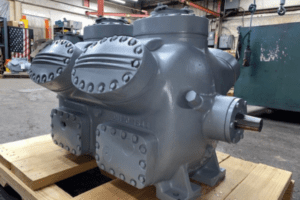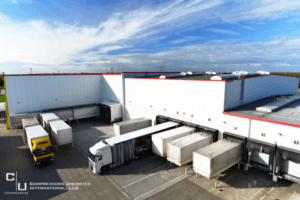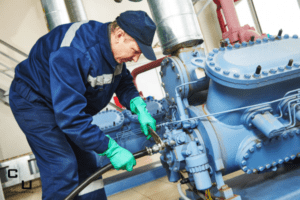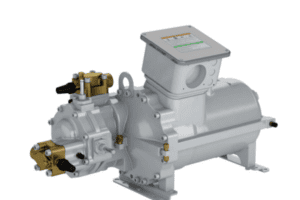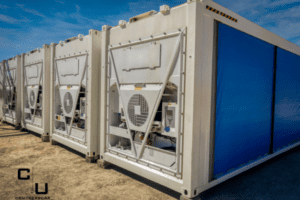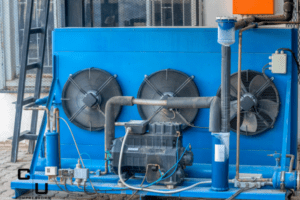Hospitals are no longer under the strain they were last year, but it’s no less important for their HVAC systems to work at peak efficiency. A hospital’s HVAC system is among its first lines of defense against the spread of disease, including transmission between patients.
Hospital HVAC Systems Must Help Protect Against Dangerous HAIs
People go to the hospital to recover and heal. But it is no secret that any time you are in a hospital, you are at risk of HAI – hospital-acquired infections. While some of these are associated with oversights in a care environment, many others are directly related to air circulation.
Patients already on a ventilator, often as a result of respiratory infection, may face further complications if germs enter their lungs through ventilator tubes, leading to ventilator-associated pneumonia. Those in treatment with antibiotic medication are at risk of CDI, which causes lasting intestinal symptoms.
Healthcare professionals at all levels are trained in many different approaches to minimize these and other infections. Keeping surfaces clean and properly disposing of single-use materials, such as sharps, helps reduce the risk. To support that effort, a hospital’s HVAC system must perform at a high level.
Hospital HVAC configurations are unique for a variety of reasons. Each room may have distinct HVAC requirements – for example, constant venting to the outside or always-on HVAC service whether the room is in use or not. ASHRAE Standard 170 lists ventilation requirements for nearly 100 room types.
New Hospital HVAC Design Strategies Improve Ventilation Performance
Hospitals around the United States are currently refitting their HVAC systems to take advantage of innovative technologies. Likewise, new hospitals are sure to leverage the lessons learned in recent years. In some cases, major renovations are necessary to capture improved performance.
For instance, many hospital HVAC systems now utilize particle filtration through advanced HEPA filters, even in areas where such filtration was not considered necessary before. Although extremely effective in removing pathogens from circulation, HEPA filters reduce air distribution.
As a result, updating the system is not as simple as finding the right juncture to implement a new level of filtration. HVAC professionals must ensure enough fan power at the air handling units to support the new approach. Today, HEPA filter racks are in frequent use on AHUs that serve negative pressure areas.
This same type of cause and effect relationship can be seen in many different elements of the HVAC system, where engineers must find a balance between new capabilities and increasing demand on limited resources. Another challenge is in the use of air handling units themselves.
In light of warnings about possible future pandemics, some hospitals are choosing to upgrade AHUs for distinct operational configurations: Minimizing outside air intake during normal conditions and offering 100% outside air during pandemic conditions or a similar emergency.
To make this possible, many organizations – especially smaller ones – will need to consider investment in standby cooling equipment. Smaller facilities in particular often lack the capacity to increase outside air without compromising on the comfort of patients in affected areas.
All these diverse trends and many more are actually pointing in a single direction: It is more crucial than ever for hospitals to plan their HVAC systems for maximum redundancy. To do that, it’s wise to start at the most vital component within the entire setup: The commercial compressor.
For Modern Hospitals, “One Is None” When It Comes to Commercial Compressors
There’s an old saying attributed to the U.S. Navy SEALS:
“Two is one and one is none.”
It refers to the unexpected challenges that can arise in any real-life situation, damaging key equipment and resources that the operation relies on. While there are many potential points of failure for today’s hospitals, none are more essential to the HVAC system itself than the commercial compressor.
The compressor is often called the heart of the system. This is apt because it performs the mechanical labor necessary to make refrigerant gas available to components down the line. While the compressor can work harder to make up for shortfalls in other parts, the reverse is not true.
When the compressor fails, everything else comes to a stop. And though most HVAC problems have little to do with the compressor, the repercussions are serious enough that hospitals must be ready.
With a remanufactured commercial compressor, you receive a unit that meets the strict environmental and performance standards you require at a fraction of the OEM cost. All units are thoroughly tested to ensure they are ready to be deployed for a lifespan of 8-10 years.
At a time of high costs and tight budgets, remanufactured commercial compressors are putting a world-class level of redundancy within reach for small hospitals, community clinics, and even regional medical centers that may have dozens of compressors in service.


